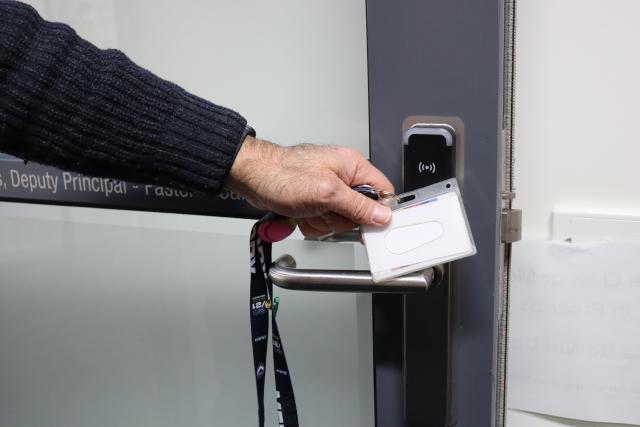Mount Lilydale Mercy College (MLMC) has introduced a new ID card system to help to prevent antisocial behaviour, bullying, vandalism and vaping in toilet facilities.
After trialling extra yard duties, the school rolled out the student ID system to each student to use to enter the bathroom and other school facilities, with teachers also using the same ID card system.
Students can access the bathroom by tapping the doorknob with the card, which also doubles as a library card and an access card to printers and photocopiers.
MLMC deputy principal of pastoral care John Rodgers said the change seemed to improve student safety since being introduced during term two.
“We had situations where students were avoiding going to the bathroom all day because older students were in the toilets designated to them.
“Students feel more comfortable using the bathroom knowing it’s only their year level using it, ” he said.
“There’s a safety issue involved in it. We are limiting the number of facilities they can use so that they are year level-specific and that helps kids not get bullied.”
According to a survey by the Anti-Bully Crusaders, more than 60 per cent of students have experienced bullying at least once in their schooling career and more than five per cent of Australian students drop out of school due to bullying.
Students will still be able to use the bathroom if they lose or misplace their card, with spare cards able to be borrowed from their year level coordinator and accessible bathrooms in the first aid room and coordinator’s offices.
“But a really big safety issue for us is if we had an at-risk student not show up to class we can quickly scan to see if the card has been used to access the door. This will allow us to find a student much quicker if needed,” Mr Rodgers said.
“In some instances there was some vandalism that was taking place during class time. The touch on lock system allows us to see who was using the toilet at the time vandalism occurred to help us narrow down our investigations.”
MLMC has also introduced vape sensors in the school bathrooms which detect particles in the air, which can cost up to $2000 per unit.
“[It] allowed us to build a stronger case that they were in there [vaping] or either in the presence of a vaper, willingly,” Mr Rodgers said
“It doesn’t stop vaping, it stops the location of vaping but what it has done is made it a safer place for those non-vapers going in the bathrooms.
“We acknowledge some students have an addiction and the College reaches out to those students and their families with support to break that addiction.”
More than 30 per cent of 14 to 17 year olds are frequent vapers, according to the first national research project, Generation Vape, which questioned a group of 700 young people.
“Hopefully the ID cards and vape detectors will stop three kids going in and two trying it for the first time because they know there’s a chance of them getting busted,” Mr Rodgers said
He called on the Victorian Government to put more funding into education on vaping in the school curriculum, with current education and webinars on vaping coming out of the pockets of schools themselves.
On 2 May the Australian Health Minister Mark Butler announced that new legislation would be used to stop the importation of non-prescription vapes, including introducing restrictions on flavours and colours.
The Victorian Government has already made it illegal for any person aged 18 or over to obtain, possess or use nicotine e-cigarettes without a prescription.
“You see on the news, videos of kids being hospitalised because of vaping. Vaping is something we don’t know enough about,” Mr Rodgers said.
Mr Rodgers said he uses the theory of Rudy Giuliani, former mayor of New York, called the broken windows theory – every problem that goes unattended in the environment affects the community’s attitudes and leads to more problems.
“Because his thought was if you leave a broken window, it’ll encourage other people. But if you’ve got excellence around you then that improves the standard of people,” he said.
“Do I recommend this card for other other schools? If it helps resolve some of the issues we were having. It absolutely helped us.”
VicHealth, the Victorian’s Government health promotion foundation, is calling on the government to take action on vaping following claims of students being hospitalised.
A Department of Education spokesperson said the health and safety of students was their highest priority.
“The Department supports schools to provide students with drug education delivered as part of the Victorian Curriculum and through a range of resources and guidance.,” they said.
“The Department continues to work in partnership with organisations such as Quit and Cancer Council Victoria to develop and share guidance and support for schools and families related to e-cigarettes.”







